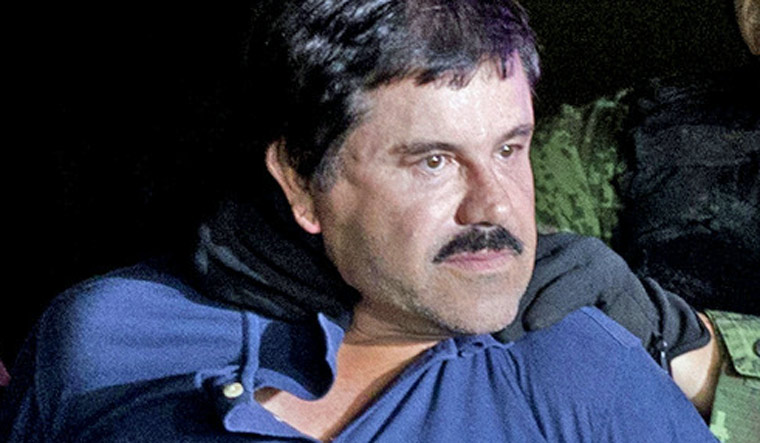Four decades after evading the police, crime lord Joaquin Guzman, also known as El Chapo has been convicted of crimes spanning a quarter-century in a trial that laid bare his lavish lifestyle and penchant for extreme violence as head of one of the world's most powerful gangs.
The 61-year-old former boss of the notorious Sinaloa cartel — famed for his brazen escapes from Mexican prisons — faces life in prison for smuggling tons of cocaine, heroin, methamphetamine and marijuana into the United States.
Other charges against Chapo include money laundering and weapons possession. He has been found guilty of all these during a three-month trial in which witnesses described the mob boss beating, shooting and even burying alive those who got in his way.
"The verdict was a tremendous victory for the rule of law, for Mexico, the United States and other countries that have been victims of the Sinaloa cartel," Mike Vigil, former head of international operations for the US Drug Enforcement Administration, said.
"Chapo Guzman was the world's greatest drug lord of all time," Vigil added.
Guzman's ex-henchmen and a former mistress took to the stand against Guzman under the gaze of a stocky gangster during the three-month trial. The ex-henchmen provided some of the most compelling testimonies with gruesome details about torture killing of rivals. On one occasion, the court heard, Guzman beat two members of the Zetas cartel with a thick tree branch till their bones were broken before shooting them dead.
also read
- UP news: Jilted lover castrates boyfriend who wanted to break up and marry another woman; but why is it called 'bobbittised' ?
- New York: Woman dies after being set on fire on Brooklyn subway; suspect watched her burn alive, says police
- Brian Thompson: Did UHC CEO shooter lower mask to flirt with hostel staff? New York Police releases face of man who...
Former beauty queen Emma Coronel, showed up almost every day in court to be with El Chapo, her husband. After sentencing on June 25, Guzman is likely to be transferred to a so-called "supermax" prison in Colorado, sometimes called the "Alcatraz of the Rockies" and considered one of the most secure in the US. US, which failed to obtain extradition of Escobar, sees Chapo's conviction as a big win.
Guzman's lawyer Bill Purpura said his client had expected the verdict but was a "guy who never gives up" and had vowed to appeal.
During the trial, the government presented 56 witnesses and troves of incriminating material, including intercepted calls between Guzman and his associates, and conservations taped secretly by informants.
Former employees testified that the cartel paid bribes of millions of dollars at the highest levels of government, including to former President Enrique Pena Nieto, who denies the allegation. Guzman's opulent lifestyle too, was highlighted during the trial. His ex-pilot and former cartel manager for Mexico City testified that Guzman had four airplanes, numerous houses including a mansion in Acapulco, a yacht named "Chapito" and a ranch that included a zoo and a small railway.
Late last month, Jeffery Lichtman, another of Guzman's lawyers, asked the jury not to convict on the basis of the "garbage" testimony of government witnesses.
Lichtman contended that Guzman was merely a "scapegoat," and that the real culprit in the drug trafficking operations was Ismael "El Mayo" Zambada, the co-founder of the Sinaloa cartel.
The government, meanwhile, appealed to the jury not to let Guzman "escape" — an allusion to his two spectacular jail breaks in Mexico, the last in 2015 through a tunnel from a shower area in his cell.
The defence called just one witness, an FBI agent put on the stand in an attempt to undermine the credibility of one of Guzman's cocaine suppliers who had testified against him.
The defence's strategy centered on attacking the credibility of the cooperating witnesses — former secretaries, pilots, cocaine suppliers, Guzman's top trafficker in the United States, a manager, an accountant, a former communications chief, and a former lover.
Most are serving prison sentences and hoped to have their penalties reduced in return for their cooperation with prosecutors.
With inputs from PTI


